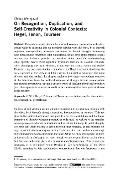On Recognition, Duplication, and Self-Creativity in Colonial Contexts: Hegel, Fanon, Tournier

Datum vydání
2022Publikováno v
Perspectives on the Self: Reflexivity in the HumanitiesNakladatel / Místo vydání
De Gruyter (Berlin)ISBN / ISSN
ISBN: 978-3-11-069845-9Informace o financování
MSM/EF/EF16_019/0000734
Metadata
Zobrazit celý záznamKolekce
Tato publikace má vydavatelskou verzi s DOI 10.1515/9783110698510-012
Abstrakt
This article posits that no form of self-creation, personal or collective, occurs without engaging into an agonistic relation with the other, be it through negation, incorporation, inventive translation, or frontal struggle. Examining how intellectuals concerned with anticolonial fights have appropriated Hegel's master-slave dialectic provides an excellent entry point for understanding what specific facets these agonistic dynamics take on in colonial contexts. After identifying the main elements of novelty that Frantz Fanon and Michel Tournier-my two case studies-introduce into Hegel's account (involving the racial identity of the servant and the master, the narrative sequence, the point of view, and the reader), the chapter explores how these two authors conceive of the transition from the material violence of struggle to true emancipation and mutual recognition, opening up new ways of thinking about self-creativity (i.e., the capacity to reinvent oneself) as an intersubjective enterprise of shared sense-making.
Klíčová slova
Hegel, Fanon, Tournier, postcolonial, recognition
Trvalý odkaz
https://hdl.handle.net/20.500.14178/1609Licence
Licence pro užití plného textu výsledku: Creative Commons Uveďte původ 4.0 International


